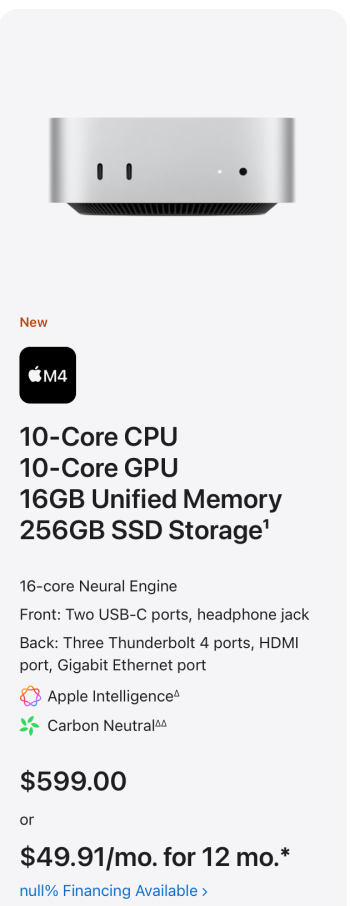Anybody who isn't irrevocably committed to buying a Mac and/or accepts that 80% of computer users somehow manage to get by without MacOS, and who doesn't believe that Apple's LPDDR5 RAM contains magic unicorn dust that makes each byte twice as big as on PC LPDDR5 RAM. Anybody who is aware that much of the software they are running is largely the same code as the PC versions and will have similar RAM demands.Not defensible to whom? Consumers, enterprise?
Anybody who compares prices and sees that MacBook Air-comparable low-$1000s PCs are now coming with 16GB standard and/or BTO upgrades at half of Apples prices, or that MacBook Pro-comparable $1500-$2000+ PCs are typically coming with 32GB.
Anybody who does the math and sees that bringing the RAM and storage up to PC levels typically adds $400-$600 to the price of a Mac.
But it has gone now - Apple's line-up has changed with the entry-level Pro now having the same body and screen as the full Pro (plus MagSafe and HDMI), and a bit of a corresponding price bump. Sounds like the M4 version will be getting the same port & external display specs as the current M3 Pro, too. I guess these hypothetical corporate customers were finally convinced to switch to Air or swallowed the (fairly small) price bump to get the 14" with better screen and connectivity.It was stated in the past when the MBP 13” touchbar was still around that was also ‘not defensible’ but it lasted as long as it did apparently for corporate buyers.
This issue with the RAM is not new - 8GB has been the base MBP spec and $200-per-8GB the upgrade cost for at least 10 years - in which time we've gone from 2 to 8 cores, 3x faster single core, 7x faster multicore... I don't know what possible confusion of ideas makes people think this won't increase demand for RAM. The final straw is MS making 16GB the minimum for some features in their software. Many Mac users use MS Office, many developers using MBPs for, say, web development, use VS Code. That 16GB minimum is going to start cropping up in corporate tenders and consumers' tick-lists - even if it doesn't technically apply to Macs.
16, 24 or 32GB RAM is hardly "maxing out" in 2024, especially on a machine where the RAM can't be expanded after purchase. It's really only Apple that makes > 8GB RAM an expensive luxury rather than a false economy.I believe also that a lot of users simply to ‘max’ out the machines they buy.
I've never met a corporate bean-counter who took notice of TCO. Purchase price is capital expenditure, TCO is "cost of doing business" - different account, different box on the tax form, somebody else's problem. Leasing/preferred supplier contracts will be designed to offer a great deal on a "standard basket" of specs and charge a fortune for any exceptions. Even for a private buyer... $400 extra cashy money today vs. some hypothetical "all being well" saving over 5 years...? Yeah.Do you mean TCO (total cost of ownership) or just purchasing price?
Well, no reviewer talks about Snapdragon X without mentioning Apple Silicon - and, presumably, reviewers influence buyers. Qualcomm would like you to think that the Snapdragin X elite - their better model - is a competitor to M3 Pro, but regular M3 is probably a better comparison. Main thing stopping Windows users switching is patchy support for "legacy" Windows software and games - anything properly supported seems to perform pretty well, Maybe not such a deal breaker for switching Mac users who can pick modern software. I think the Snapdragon-X ThinkBook models I highlighted - or the MS Surface Laptops - are good comparisons.I’m not trying to ‘dismiss’ this, but I would like to know, if possible at all, what are the competing products of a MBP.
Otherwise... it doesn't have to be Snapdragon X - Intel's offerings are currently a bit rubbish, but AMD have some nice laptop chips. Most major PC manufacturer offer a bunch of cheap $300-$900 machines (so you can always find something with 4GB RAM and whatever the current Celeron equivalent is) but also have a "premium" models of small, light, low-power laptops that are very clearly inspired by MBP and MBA and targeted at potential Mac customers, in a similar price range.
Don't get me wrong - I prefer MacOS over Windows given the choice, but there are limits if we're talking about a $400 premium to get decent RAM and storage on a Mac.


